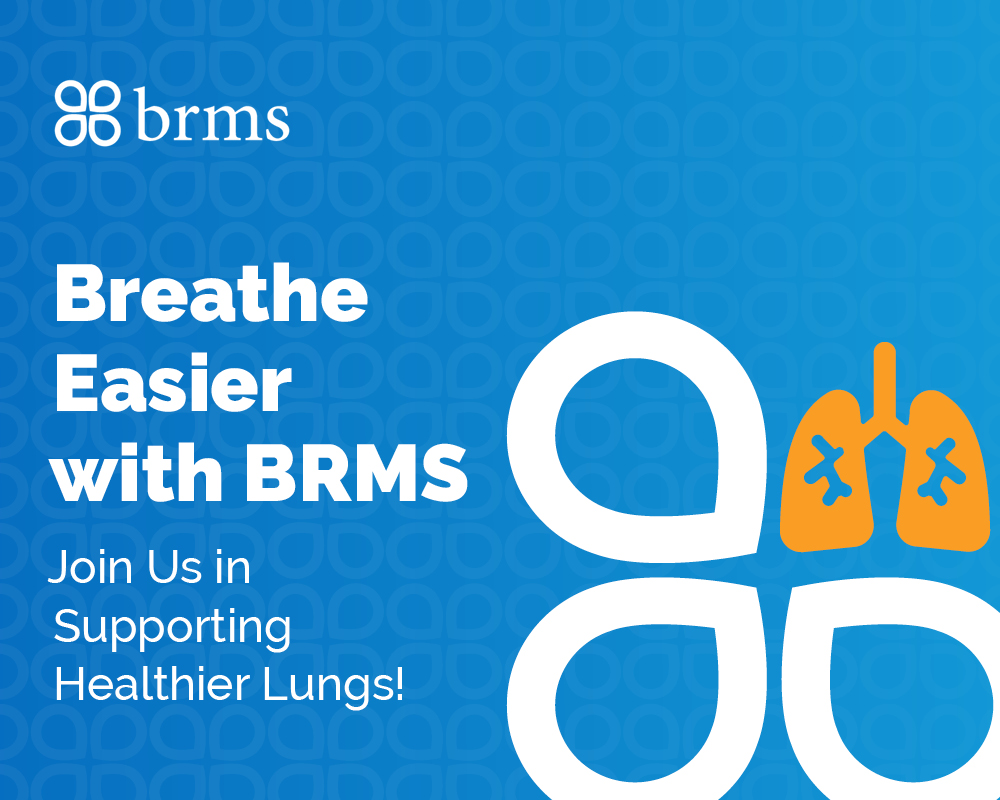

About every second of the day, your lungs play a vital role in keeping you alive. They work hard oxygenating the body and removing carbon dioxide, which means doing your part to keep them healthy is equally as vital! From secondhand smoke to diseases, there are a number of conditions that can affect your lung health. Join BRMS as we work to support better breathing and healthier lungs through helpful tips and insights.
![]()
- Over 35 million people in the U.S. live with a chronic lung disease.*
- Around 10 million people develop tuberculosis each year.**
- Close to half a million Americans die from tobacco-related diseases each year.*
- Asthma affects around 26.8 million Americans, resulting in billions of dollars in healthcare costs.*
- Over the past decade, smoking rates among adults have fallen by 17%.***

Go for Good Nutrition
What you eat can help protect your lungs from the inside out. Foods rich in antioxidants like leafy greens, berries, and nuts, can combat inflammation and keep your immune system strong, making it easier for your body to fight off illnesses that may affect your lungs. A balanced diet that includes lean proteins, whole grains, and plenty of colorful produce can also provide the nutrients your lungs need to function at their best. Choosing healthy foods is a simple way to give your respiratory system an everyday boost.
Get Your Annual Vaccines
Vaccines not only help you avoid seasonal sickness, but they serve as a key defense for your lungs as well. Annual flu shots, COVID-19 boosters, and pneumonia vaccines can help your body ward off serious infections that put stress on the respiratory system. For people with asthma, COPD, or other chronic lung conditions, staying up to date on vaccinations can be especially important. By making vaccines part of your yearly routine, you give your lungs an added layer of protection and help safeguard your overall health.
Exercise Your Lungs
Exercise not only keeps your body in shape, but it strengthens your lungs, too. Aerobic activities like brisk walking, cycling, or swimming challenge your respiratory system and improve both lung capacity and efficiency over time. Even simple daily movement, like taking the stairs or doing light stretches, can support healthier breathing. Making consistent aerobic exercises part of your regular routine also helps reduce the risk of chronic conditions, ultimately boosting energy levels and making it easier to live life fully.
Breathe the Fresh Air
The air you breathe has a big impact on your lung health. Whenever possible, avoid environments filled with smoke, heavy pollution, or strong chemical fumes, as they can irritate and damage your lungs over time. Using air purifiers indoors, steering clear of secondhand smoke, and choosing outdoor spaces with cleaner air are small but effective ways to safeguard your breathing. Protecting your lungs from environmental stressors today can make a noticeable difference in your long-term well-being.
If You Smoke, Take Steps to Quit
On that note, one of the most powerful steps you can take to improve your lung health is quitting smoking, or encouraging loved ones around you to quit. Tobacco damages your lungs with every puff, but the good news is your body begins healing almost immediately after you stop. Within weeks, your breathing improves and your risk of lung disease starts to decline. Quitting may be difficult, but support groups, medications, and healthcare resources can help you succeed.
Breathing is something we can easily take for granted, but every day your lungs are working hard to keep you alive and energized. You can help your lungs stay healthy just by incorporating small changes each day. Let’s work together to promote healthier lungs and futures!
Sources:
* https://www.lung.org/about-us/our-impact
** https://ginasthma.org/wp-content/uploads/2019/09/World-Lung-Day-2019-Fact-Sheet-v2.pdf
*** https://www.lung.org/research/trends-in-lung-disease/tobacco-trends-brief
